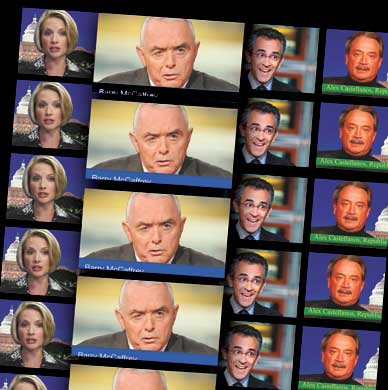Experts Get Paid: Inside The Lobbying Media Complex
Corporate lobbying is the root of our evil.
---
President Obama spent most of December 4 touring Allentown, Pennsylvania, meeting with local workers and discussing the economic crisis. A few hours later, the state's former governor, Tom Ridge, was on MSNBC's Hardball With Chris Matthews, offering up his own recovery plan. There were "modest things" the White House might try, like cutting taxes or opening up credit for small businesses, but the real answer was for the president to "take his green agenda and blow it out of the box." The first step, Ridge explained, was to "create nuclear power plants." Combined with some waste coal and natural gas extraction, you would have an "innovation setter" that would "create jobs, create exports."
As Ridge counseled the administration to "put that package together," he sure seemed like an objective commentator. But what viewers weren't told was that since 2005, Ridge has pocketed $530,659 in executive compensation for serving on the board of Exelon, the nation's largest nuclear power company. As of March 2009, he also held an estimated $248,299 in Exelon stock, according to SEC filings.
Moments earlier, retired general and "NBC Military Analyst" Barry McCaffrey told viewers that the war in Afghanistan would require an additional "three- to ten-year effort" and "a lot of money." Unmentioned was the fact that DynCorp paid McCaffrey $182,309 in 2009 alone. The government had just granted DynCorp a five-year deal worth an estimated $5.9 billion to aid American forces in Afghanistan. The first year is locked in at $644 million, but the additional four options are subject to renewal, contingent on military needs and political realities.
In a single hour, two men with blatant, undisclosed conflicts of interest had appeared on MSNBC. The question is, was this an isolated oversight or business as usual? Evidence points to the latter. In 2003 The Nation exposed McCaffrey's financial ties to military contractors he had promoted on-air on several cable networks; in 2008 David Barstow wrote a Pulitzer Prize-winning series for the New York Times about the Pentagon's use of former military officers--many lobbying or consulting for military contractors--to get their talking points on television in exchange for access to decision-makers; and in 2009 bloggers uncovered how ex-Newsweek writer Richard Wolffe had guest-hosted Countdown With Keith Olbermann while working at a large PR firm specializing in "strategies for managing corporate reputation."
These incidents represent only a fraction of the covert corporate influence peddling on cable news, a four-month investigation by The Nation has found. Since 2007 at least seventy-five registered lobbyists, public relations representatives and corporate officials--people paid by companies and trade groups to manage their public image and promote their financial and political interests--have appeared on MSNBC, Fox News, CNN, CNBC and Fox Business Network with no disclosure of the corporate interests that had paid them. Many have been regulars on more than one of the cable networks, turning in dozens--and in some cases hundreds--of appearances.
For lobbyists, PR firms and corporate officials, going on cable television is a chance to promote clients and their interests on the most widely cited source of news in the United States. These appearances also generate good will and access to major players inside the Democratic and Republican parties. For their part, the cable networks, eager to fill time and afraid of upsetting the political elite, have often looked the other way. At times, the networks have even disregarded their own written ethics guidelines. Just about everyone involved is heavily invested in maintaining the current system, with the exception of the viewer.
While lobbyists and PR flacks have long tried to spin the press, the launch of Fox News and MSNBC in 1996 and the Clinton impeachment saga that followed helped create the caldron of twenty-four-hour political analysis that so many influence peddlers call home. Since then, guests with serious conflicts of interest have popped up with alarming regularity on every network. Just examine their presence in coverage of the economic crash and the healthcare reform debate, two recent issues that have engendered massive cable coverage.
As the recession slammed the country in late 2008 and government bailouts followed, lobbyists and PR flacks took to the air with troubling regularity, advocating on behalf of clients and their interests while masquerading as neutral analysts. One was Bernard Whitman, president of Whitman Insight Strategies, a communications firm that specializes in helping "guide successful lobbying, communications and information campaigns through targeted research." Whitman's clients have included lobbying firms like BGR Group and marketing/PR firms like Ogilvy & Mather, which in turn have numerous corporate clients with a vested interest in shaping federal policies. Whitman is a veteran of the Clinton era and when making television appearances continues to be identified for work he did almost a decade earlier.
According to its website, Whitman Insight Strategies has worked for AIG to "develop, test, launch, and enhance their consumer brand," and continues to assist the insurance giant "as it responds to ongoing marketplace developments." Whitman Strategies has also posted more than 100 clips of Bernard Whitman's television appearances on a YouTube account. During a September 18, 2008, Fox News appearance to discuss Sarah Palin, Whitman proceeded to lambaste John McCain for proposing to "let AIG fail," saying that this demonstrated "just how little he understands the global economy today."
On March 25, 2009, in the midst of a scandal over AIG's executive bonuses, Whitman appeared on Fox News again. "The American people were understandably outraged about AIG," he began. "Having said that, we need to move beyond anger, frustration and hysteria to really get down to the brass tacks of solving this economy," he advised the public. In neither instance was Whitman's ongoing work for AIG mentioned.
---
Continue reading at the Nation (there's much more) >>


 Feb 17, 2010 at 9:47 AM
Feb 17, 2010 at 9:47 AM
Reader Comments (1)
Money, money, money...